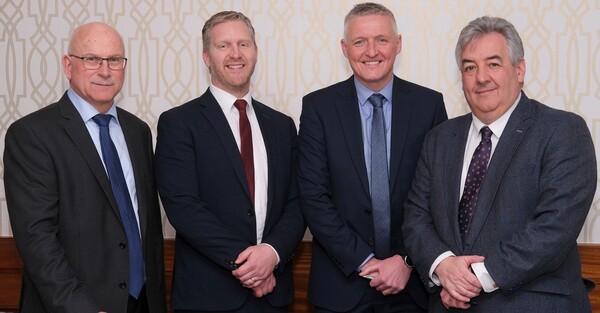6th March 2024
Mr Gary McIntyre, Head of Feed Milling with Moy Park, has been elected as the new President of the Northern Ireland Grain Trade Association (NIGTA) for 2024 - 25 following the Association’s Annual General Meeting which was held on 6th March 2024.
Gary started his career in North Antrim Turkeys in 1996, then transferred to O’Kane Poultry before moving to G. E. McLarnon & Sons Feed Mill in 1999. Having worked in several roles within the McLarnon Feeds business, and subsequently Moy Park, Gary is now responsible for the feed milling operation for the Moy Park/Pilgrims business across the UK.
Gary thanked outgoing President, Mr Patrick McLaughlin for his achievements over the previous year and said that it was an honour to be elected President of NIGTA.
Commenting after the meeting, Gary said, “The Association has always been a champion for our industry and we represent our members both in agriculture and the wider agri-food industry in Northern Ireland in the many challenges we face. We will continue to collaborate with all stakeholders and government departments as we navigate our way through the various agenda points, not surprisingly, the sustainability challenges of carbon and ammonia emissions are a high priority for us.
“Within NIGTA, we have a fantastic team of subject matter experts who represent our members and NI agriculture on all of the key bodies and forums across the industry, and the association will continue to effectively use our voice to ensure Northern Ireland Agriculture is in the best position possible to grow and to produce the highest quality food.”
Mr David O’Connor, Managing Director at Feed Materials Importer, Cefetra, was installed as Vice President for 2024-2025.
Claudine Heron, CEO of W&R Barnett has stood down from the Executive in favour of Ben Fraser also of W&R Barnett. Immediate Past president, Patrick McLaughlin paid tribute to her considerable contribution to NIGTA in the fifteen years since her appointment.
Outgoing President, Mr Patrick McLaughlin reflected on the activities of the Association over the past year, where our landscape has been dominated by the sustainability agenda, and the Northern Ireland Protocol. Following on from the passing of the Northern Ireland Climate Change Act in 2022, NIGTA established a Sustainability Committee to focus on the environmental challenges that our local agri-food industry now faces. The climate change legislation has laid down ambitious targets and NIGTA is committed to working closely with all the stakeholders to help meet these requirements. In April 2023 NIGTA ran a successful Environmental Footprinting Workshop in Cookstown and the association has also agreed to support The NI Carbon Steering Group.
NIGTA as a member of the NI Business Brexit Working Group, has engaged with politicians, officials, and stakeholders to highlight the practicalities and impacts of proposed measures. NIGTA will continue to press for improved trading links for Northern Ireland within the UK, to Europe and further afield.
Following the AGM, NIGTA hosted its quarterly lunch for members where Ian Stevenson CEO of the NI Dairy Council was as the guest speaker.
Ian outlined the work of the Dairy Council and the collaboration with other Trade Associations such as NIGTA in “Telling our Story” to promote the healthy, safe and environmentally aware food we produce here in Northern Ireland.
DO YOU KNOW YOUR BLOOD PRESSURE?
The Northern Ireland Agri-Rural Health Forum* has launched its first campaign, encouraging farmers to get their blood pressure checked.
NIGTA is proud to support the NI Agri-Rural Health Forum and this very important campaign.
Farmers know the dangers of driving on over inflated tyres. Living with high blood pressure is like driving with an over inflated tyre. You need to take control and think about:
- You can check it, change it, and control it.
- You may feel well but high blood pressure could still be causing damage.
- Small changes will make a big difference.
- It is free to check, the only cost to you is your time.
- If you don’t measure it, you can’t manage it.
Many people with high blood pressure feel fine. But even if you feel fine, you should still have your blood pressure checked regularly. If you're a healthy adult over 40, it's recommended that you get it checked regularly but if you're at increased risk of high blood pressure, you should have it checked more often. If you have high blood pressure, it’s important to know that you’re not alone. It’s important to find support from the people around you and healthcare professionals. Make sure you check your blood pressure and keep a diary of your readings regularly, so you can see your progress.
Don’t delay, get it checked today – at your local GP, pharmacy or with the Farm Family Health Checks van.
For more information on blood pressure signs and symptoms click here – https://www.bhf.org.uk/informationsupport/risk-factors/high-blood-pressure/symptoms-and-treatment.
*The Northern Ireland Agri-Rural Health Forum, chaired by Dr Rebecca Orr and co-ordinated by Rural Support, brings together key decision-makers in the agriculture, public health, community and voluntary sectors, and related commercial organisations to help influence public opinion and ensure the appropriate incorporation of mental and physical health needs in agri-rural communities into strategy and policy development. As a group of individuals and organisations supporting the agri-rural sector in Northern Ireland we are committed to helping improve the health and wellbeing of citizens who live in the agri-rural community.
Members of the Forum Steering Group includes Dr Rebecca Orr, Rural GP trainee (clinical and research); Rural Support; UFU; NFU Mutual; United Feeds; Chestnutt Animal Feeds Ltd; Ulster Bank; Danske Bank; YFCU; HSENI; Northern Health and Social Care Trust; Farm Family Health Checks Programme; VetNI; ABP Food Group; Healthy Living Centre Alliance; PHA; Mindwise; Moy Park; NIGTA.
Farm Businesses in Zone 2 are encouraged to apply for the Soil Nutrient Health Scheme
On 26th June, zone 2 of the Soil Nutrient Health Scheme (SNHS) opened, covering Fermanagh, the west of Country Armagh and South Tyrone. Farm businesses located in these areas are strongly encouraged to register for the scheme using the following link - www.daera-ni.gov.uk/onlineservices. Participating in the scheme is a condition of receiving future funding from DAERA such as the new Farm Sustainability Payment. The closing date is 31 August 2023.
The SNHS provides each farm business with important information on soil nutrient levels for each field and a baseline estimate of the amount of carbon stored in the soils, hedgerows and trees.
Good evening, distinguished guests, past presidents, ladies and gentlemen.
I am honoured to be speaking to you tonight as President of the Northern Ireland Grain Trade Association. It is a privilege for a maiden city boy to be in such an esteemed position in the Northern Ireland agri-food industry.
We gather here tonight to celebrate the agri-supply sector in Northern Ireland and the pivotal role that you all play in ensuring its growth and success.
I would like to take a moment to acknowledge the exceptional circumstances that we have faced in the past few years - but as always, we have stepped up and faced those challenges head on.
During the past 12 months, uncertainty and volatility have dominated the agri-supply trade, largely driven by the devastating war in Ukraine, which has had a profound effect on the entire economy, not least the feed, fertilizer, and energy markets.
Given the importance of Ukraine to global trade, considerable efforts have been made to facilitate the flow of grain from Ukraine, through the European solidarity lanes and the landmark Black Sea Grain Initiative. However, the situation remains fragile and is something NIGTA is closely monitoring. The invasion has brought the animal feed and fertiliser sectors sharply into focus for all of society and highlighted the vital role our industry plays, as the first link in the food chain, and the valuable contribution that it makes to our agri-food industry, and to Northern Ireland as a whole.
Every sector has faced its own unique challenges, but despite the difficult trading conditions, our entire industry has shown incredible flexibility, agility, and resilience.
When it comes to EU-Exit, NIGTA has been at the forefront of protecting our industry’s best interests, and through the Northern Ireland Business Brexit Working Group, NIGTA has engaged extensively with various officials and stakeholders to bring understanding and influence to issues relevant to the agri-supply sector. We welcome the Windsor Framework as a step forward and it is reassuring to see that relations have visibly improved between the UK and EU, which we hope will continue, so that pragmatic solutions can be found to the outstanding issues that are being worked on. In particular, managing regulatory divergence will require properly developed structures and meaningful engagement with business and stakeholders, whereby NIGTA will continue to ensure that the voice of the agri-supply sector is heard.
With the world’s eyes on Northern Ireland this month - reflecting on the peace, prosperity and economic opportunity brought about by the Good Friday Agreement - I hope that it shines a spotlight on the need for clarity, certainty, support, and leadership from Stormont in the years ahead.
Sustainability remains a key priority for NIGTA, with mounting pressure coming from both policymakers and the marketplace. We are acutely aware of the challenges related to air, soil and water quality, and the risk that environmental targets could become our agri-food industry’s licence to operate, but we are also focused on the opportunities available within the animal feed and fertiliser sectors to help support our farming customers in reducing their environmental footprint to enhance the green credentials of Northern Ireland agri-food. For many years, we have been proactive in driving forward better nutrient use efficiency, and precision feeding strategies, as well as delivering professional advice at farm level, provided by our FAR accredited feed advisers, but ultimately, widespread industry collaboration will be needed to help deliver the emission reductions required. Fortunately, within Northern Ireland, we have an excellent track record of the agri-food industry working together for the common good, as demonstrated most recently by the establishment of the industry driven Carbon Steering Group, which is developing a carbon footprint programme for farms across Northern Ireland, because it is only by measuring that we can better manage.
There are green shoots emerging and much to be hopeful about. We want to be part of a region that leads in all areas, rather than one that follows.
By working together, through networks like NIGTA, we are stronger and better equipped to tackle whatever comes our way and by joining forces with others from across the industry we can ensure that our voice is heard, and that politicians and decision makers recognise the true value of what we have to offer.
The success of NIGTA is ultimately the strength and collaboration of its membership. As such, I would like to recognise the efforts of some specific individuals this evening:
Firstly, Jim Uprichard, who is the chair of our newly established NIGTA Sustainability Committee and has been representing us on the Carbon Steering and Technical Working Groups. Mary Preston who leads on all things legal and scientific. Amanda Orr who sits on the UFAS working group, which advances the high-quality assurance standards that underpin our industry. Declan Billington for the exhaustive role he continues to play in the lobbying efforts around EU-Exit and energy. Robin Irvine who diligently manages Food Fortress, our world leading feed assurance scheme, which is continuously evolving under Robin’s expert leadership, always with the aim of protecting the food chain and the end consumer. And most of all, Gill Gallagher, our Chief Executive. Those of you that know Gill will know that she works tirelessly for the betterment of our industry. On behalf of us all, thank you Gill. Finally, one of the veterans of our feed industry is retiring later this year and we could not let him go without a special mention. George Starrett from John Thompsons & Sons will no doubt be well known to you all in the room this evening. He is a stalwart of our industry, and we would like to pay particular tribute to the significant contribution that he has made to NIGTA for almost half a century. George has convened our NIGTA Scientific Committee, Chaired the AIC Organics Committee and been an active member of the NIGTA Feed Executive, always giving willingly of his time and expertise to help the Association. George, we wish you all the very best with what the next chapter has in store.
Tonight, as you are aware, we are supporting Cruse bereavement, a charity that is close to my heart as I have had personal experience of their amazing support. Thank-you for your support.
Finally, I would like to thank you all for coming this evening and propose a toast to NIGTA.
I would now ask you all to charge your glasses and be upstanding as we drink to our Association and its continued success as a partner to, and advocate for, agriculture and the food industry here in Northern Ireland.
“The Association”
2023 NIGTA Annual Dinner



















Dr Rebecca Orr (GP, farmer and researcher at Queen's University Belfast) has partnered with the Ulster Farmers' Union on a study seeking to identify what factors influence farmers' behaviour when they are told to seek medical advice about their risk of heart disease or diabetes.
Farmers are asked to complete a short questionnaire and consider taking part in an interview as part of the research. The questionnaire is available at the following link - https://forms.office.com/e/jdyTfgSat0 or a postal copy can be requested by contacting UFU HQ on 02890 370222. Those who complete the questionnaire can enter a draw to win a £100 voucher for the UFU online clothing shop.
Link to video participant information video: https://www.youtube.com/watch?v=bduSdemXhUc
Cruse Bereavement Support was the chosen charity to benefit from funds raised at the Northern Ireland Grain Trade Association’s 56th Annual Dinner held in April.
NIGTA President Patrick McLaughlin and CEO Gill Gallagher were delighted to present a cheque for £4,800 to Thelma Abernethy, Head of Cruse Bereavement Support NI and Elaine Brannigan, Community Fundraising and Engagement Manager. At the presentation, Patrick commented on the invaluable support, advice and information provided by the charity to children and adults when they lose someone close to them.
On receiving the donation, Thelma thanked NIGTA for their generous support, and highlighted the additional workstreams of the charity which also campaigns for improved bereavement support and offers bereavement training in the workplace.
The Northern Ireland (NI) Carbon Steering Group is a pioneering alliance set up to represent farmers and the agri-food industry, and progress with the carbon element of the sustainability agenda. The collaboration has been built on the recognition that an industry wide co-ordinated approach is the most effective way to ensure the industry is heard and that the best solutions are achieved for everyone in NI.
Agriculture has a key part to play in NI reaching net zero carbon emissions and the group has been working together, moulding an approach that will be farmer friendly and provide the basis for measuring and managing carbon emissions. Legal obligations and targets have been set and the group aims to deliver opportunities that will advance local agriculture sustainably.
Commenting, George Mullan, member of the Carbon Steering Group and Chair of NIFDA, said, “Under the NI Climate Change Act 2022, targets have been set which we are required to meet. To align with this, DAERA will publish its first Climate Action Plan in December 2023 requiring significant reduction in carbon emissions. Therefore, we have come together to act on behalf of our farmers and agri-food industry to ensure we achieve consistency in the direction of travel.
“Working across farmers, processors, industry bodies, government departments and research organisations, we want to ensure that appropriate solutions are provided to measure carbon emissions and identify innovative ways to reduce emissions. As a group, we’ve been able to lead from the front to develop a market strategy and support farmers to intercept potential livestock reductions.
“Reducing carbon emissions is becoming a requirement for our customers, not only in the UK, but also in export markets. It has presented us with an opportunity to find a workable system that can deliver the information required and enable the NI agri-food sector to remain competitive.”
The NI Carbon Steering Group is working in partnership with DAERA to create a programme which will help all farm businesses understand where they are on this carbon journey. As part of this and to inform the work programme with DAERA, we intend to test the concept of whole farm data collection with 100 farms in the next few weeks. Information required to test this concept will be collected following a NI Beef and Lamb Farm Quality Assurance Scheme (FQAS) inspection and during the same farm visit.
David Brown, Chair of the NI Carbon Steering Group, said “We need to ensure that we develop a programme with the farmer in mind at all times. It needs to be workable for them, ensuring an accurate and efficient process that causes minimal disruption to the farm business. The delivery of information is a key element to ensure its suitable for all parties and supports appropriate carbon reduction strategies while protecting farmers’ data.”
The Carbon Steering group added, “Tackling climate change and reducing emissions is now a key part of doing business with retailers and banks that are taking carbon emissions and environmental factors into consideration. All parts of the food chain are required to act including retailers, processors and farmers. Farmers have already done great work to reduce emissions on farm, and this data collection exercise will enable them to build upon that. We’re all on this journey towards net zero and farmers are committed to reducing carbon emissions while feeding a growing population with quality food produced to the highest standards.”
The NI Carbon Steering Group includes representatives from the Livestock and Meat Commission, Ulster Farmers’ Union, Dairy Council for Northern Ireland, NI Meat Exporters Association, NI Food and Drink Association, NI Agricultural Producers’ Association, NI Grain Trade Association, NI Pork and Bacon Forum, NI Poultry Federation, and Moy Park.
Photo caption: (Back row left to right), NIMEA chief executive Daryl McLaughlin, Moy Park agri business and live production services director Justin Coleman, NIAPA chair James Lowe, NIMEA vice-chair Terry Acheson, UFU president David Brown, LMC chief executive Ian Stevenson, DCNI chief executive Mike Johnston and NIFDA vice president Michael Bell. (Front row left to right) UFU chief executive Wesley Aston, NIGTA chief executive Gill Gallagher, NIFDA chair George Mullan and DCNI David Stewart.
The global population has grown by 1 billion people in just over a decade with the planet now supporting a total population of 8 billion. There is a need to not only feed, but also properly nourish this growing population sustainably, whilst striving to cut greenhouse gas emissions and adapt to a changing climate.
Last month world leaders gathered in the Egyptian coastal city of Sharm el-Sheikh for the annual United Nations Climate Change Conference, also known as COP 27. Prior to the conference, the United Nations Environment Program warned that urgent action is needed to be able to limit global warming to 1.5C, whilst the floods that devastated parts of Pakistan, and heatwaves that spread across Europe, are a stark reminder of the threats posed by a changing climate.
Earlier this year, Northern Ireland received its first ever Climate Change Act, which set a legally binding Net Zero target and requires net methane emissions to be reduced by 46% by 2050 compared to the 1990 baseline year. As we await a new policy roadmap of actions to achieve these targets, it is clear that research and innovation in both mitigation and adaptation will be needed alongside professional advice.
The feed industry has been leading the way in providing quality nutritional and feeding advice to farming customers on how to increase productivity, improve efficiency and enhance animal health to help reduce GHG and other environmental emissions. Around 130 local sales and advisory personnel are members of the Feed Adviser Register (FAR). FAR provides continuous professional development to ensure members are up to date with current issues related to whole farm feed planning, nutrition, health, welfare and fertility, and environmental policies. There is also a module for local FAR members which focuses on the environmental issues that are pertinent to NI and has been co-delivered with CAFRE. This training will be updated to ensure the content is relevant and reflects current policy, best practice, and scientific advancements.
A multifaceted toolkit is needed to help lower emissions. The Future Agricultural Policy makes provision for the development of an industry led Ruminant Genetics Programme which will encourage the breeding of more environmentally efficient cattle, while better farm management, nutrient management planning and improved grassland management all have a key part to play.
From a feed perspective, the industry is focused on precision nutrition to increase production efficiency and reduce emissions by supplying the correct nutrients required to support the nutritional requirements of the animals being fed. Reducing the risk from anti-nutritional factors such as mycotoxins is also important, which has been greatly aided by our world leading Food Fortress surveillance programme. In addition, paying close attention to how the feed is delivered and minimising wastage is essential. All of these initiatives are considered best practice and not only contribute to lower emissions but also enhance profitability.
There has also been increased interest in the development and use of methane suppressing feed additives in ruminant diets as a means of driving methane reductions even further, such as methanogenesis inhibitors, seaweeds, essential oils, organic acids and probiotics. Some of these products have been proven to reduce methane by up to 30% without any negative impact on performance. Further research is ongoing to establish how to optimise their use in pasture-based systems. The widespread uptake of methane reducing feed products is likely to be dependent on the financial return to be gained from using them, either in terms of some form of proven production benefit or supply chain incentive scheme.









